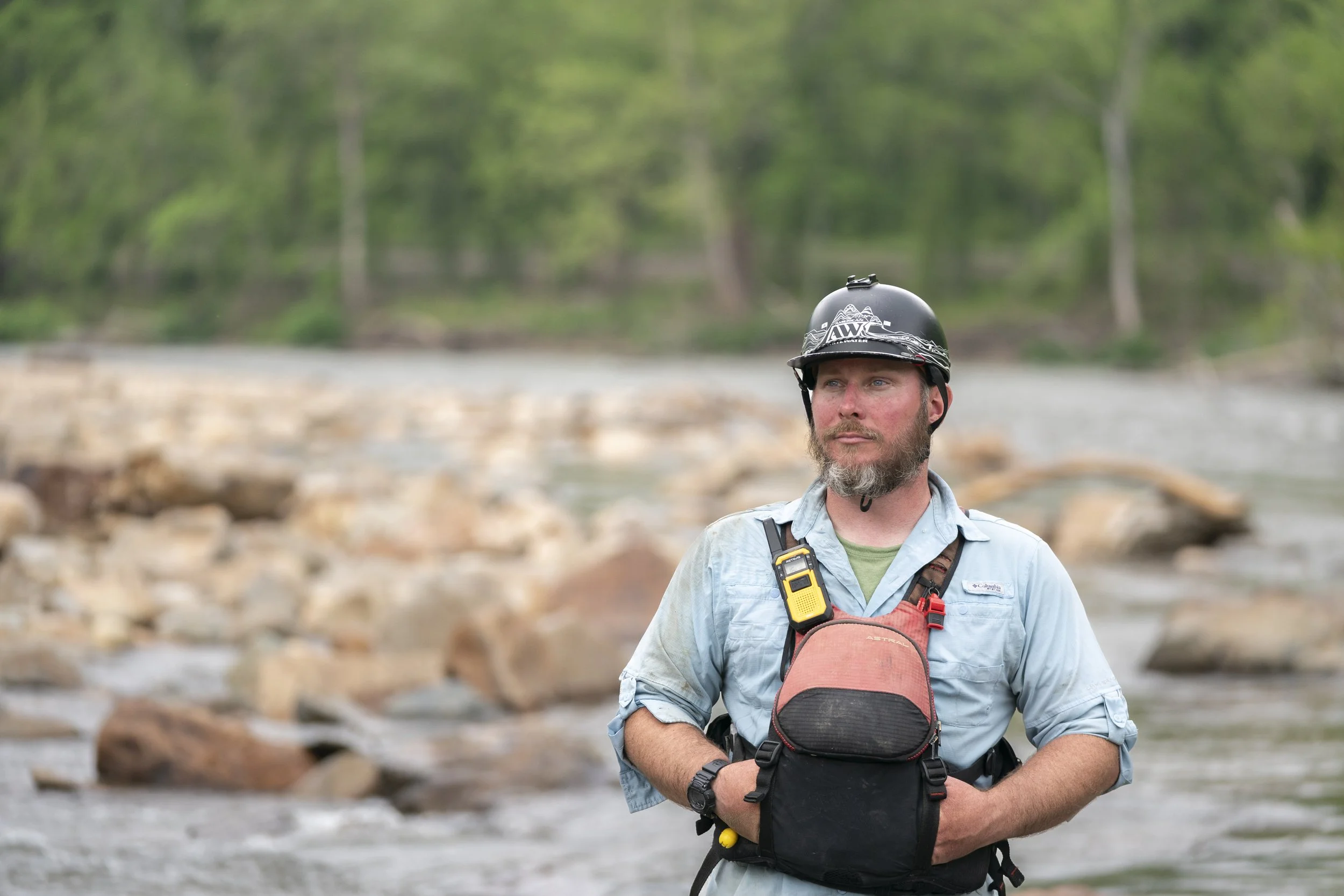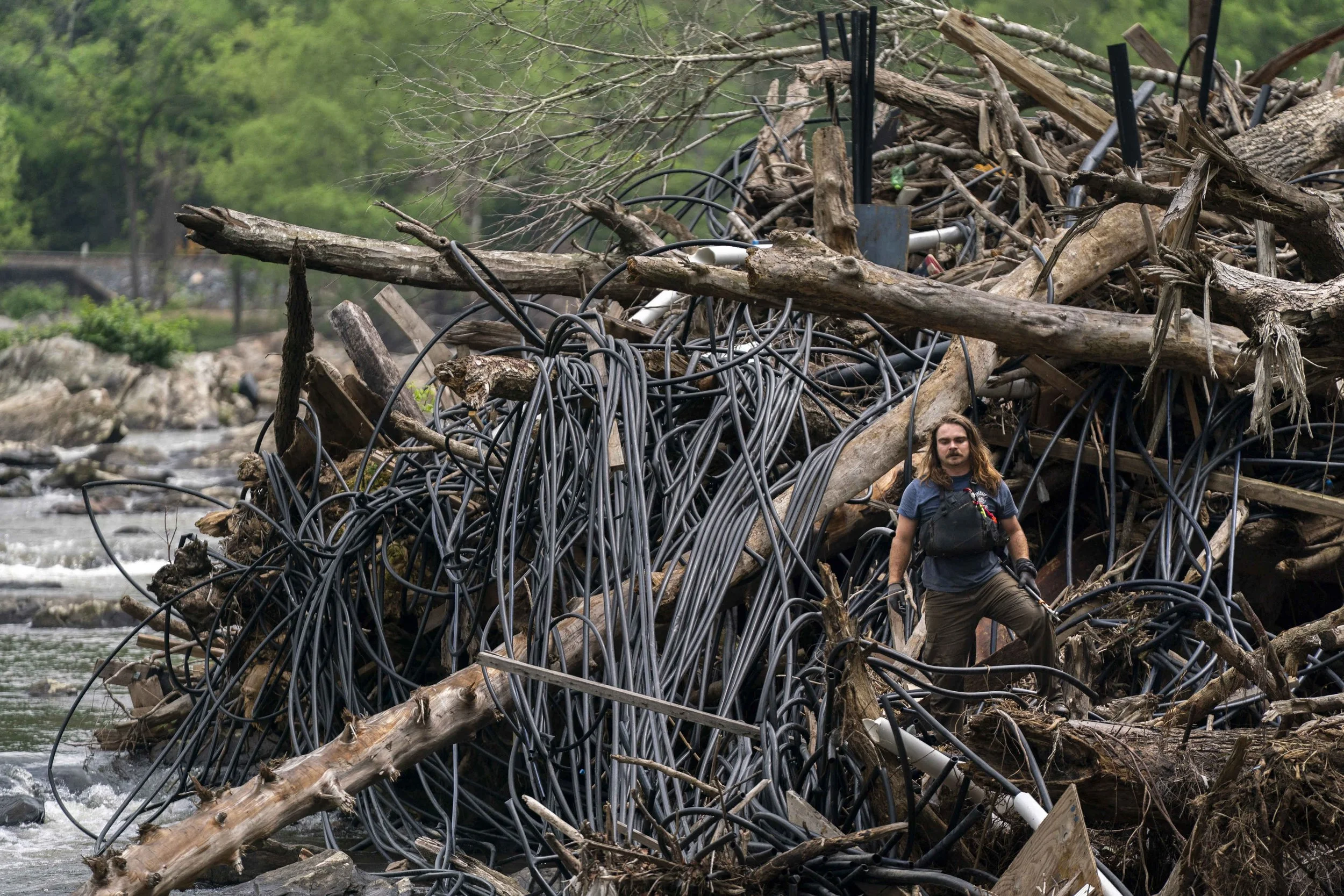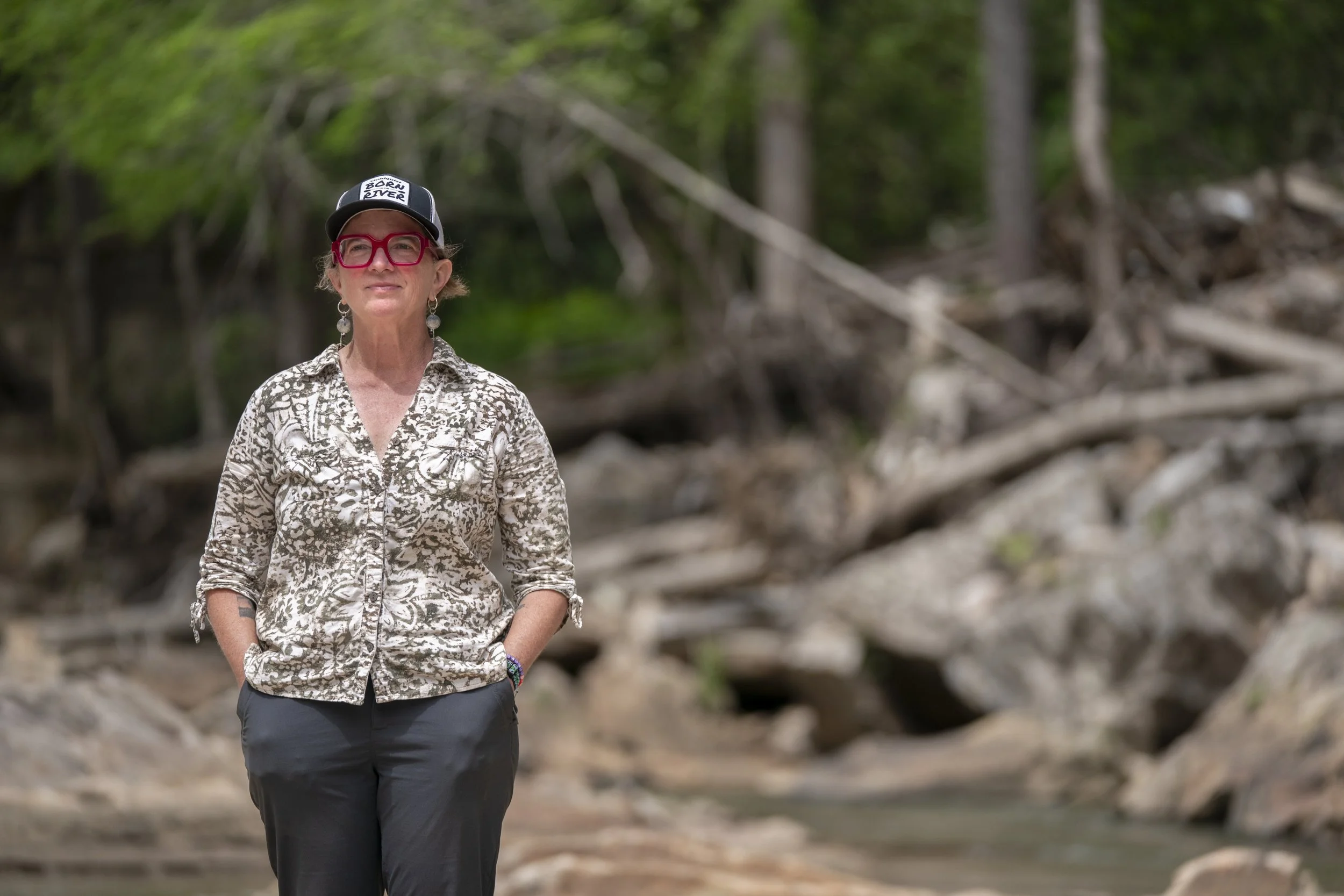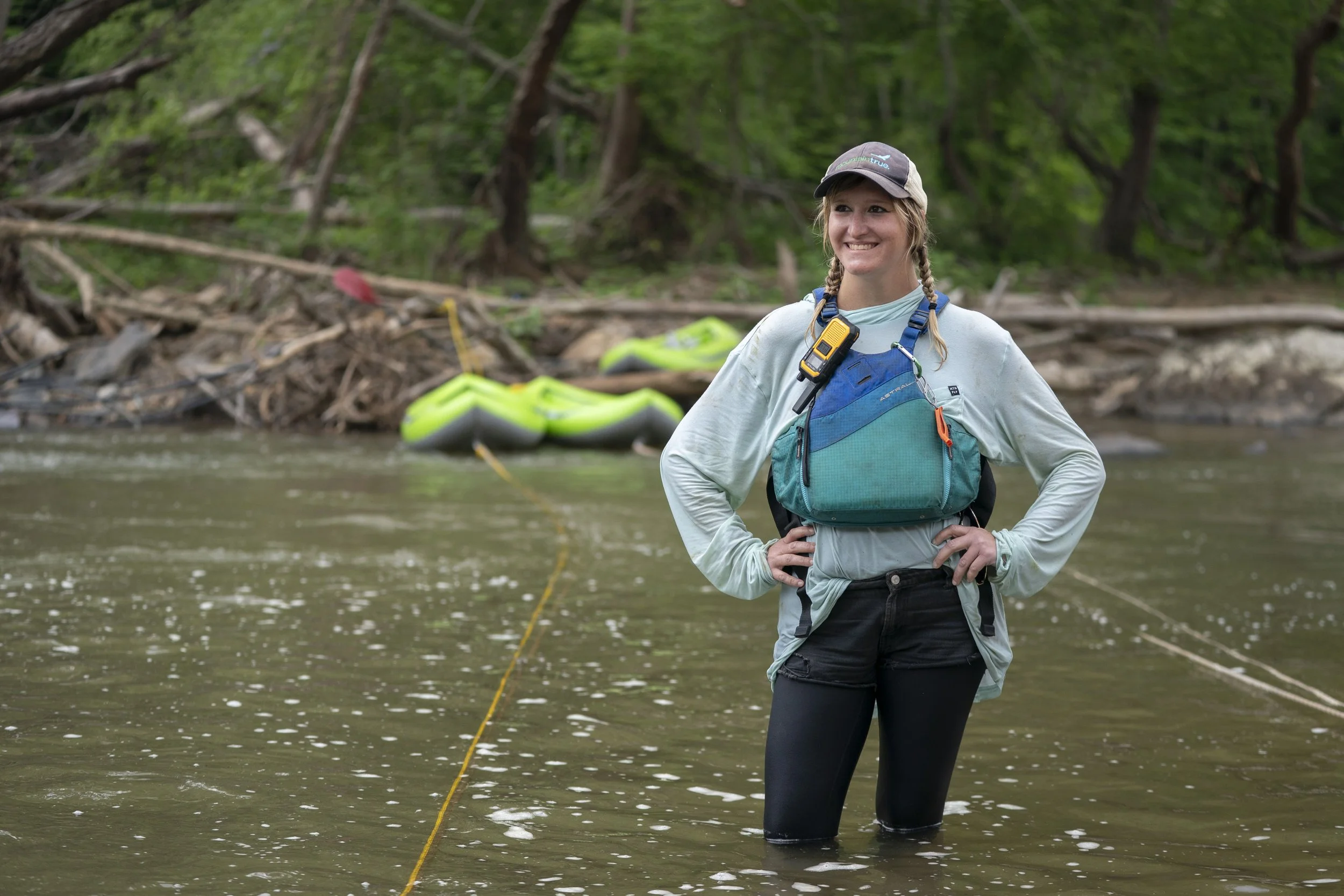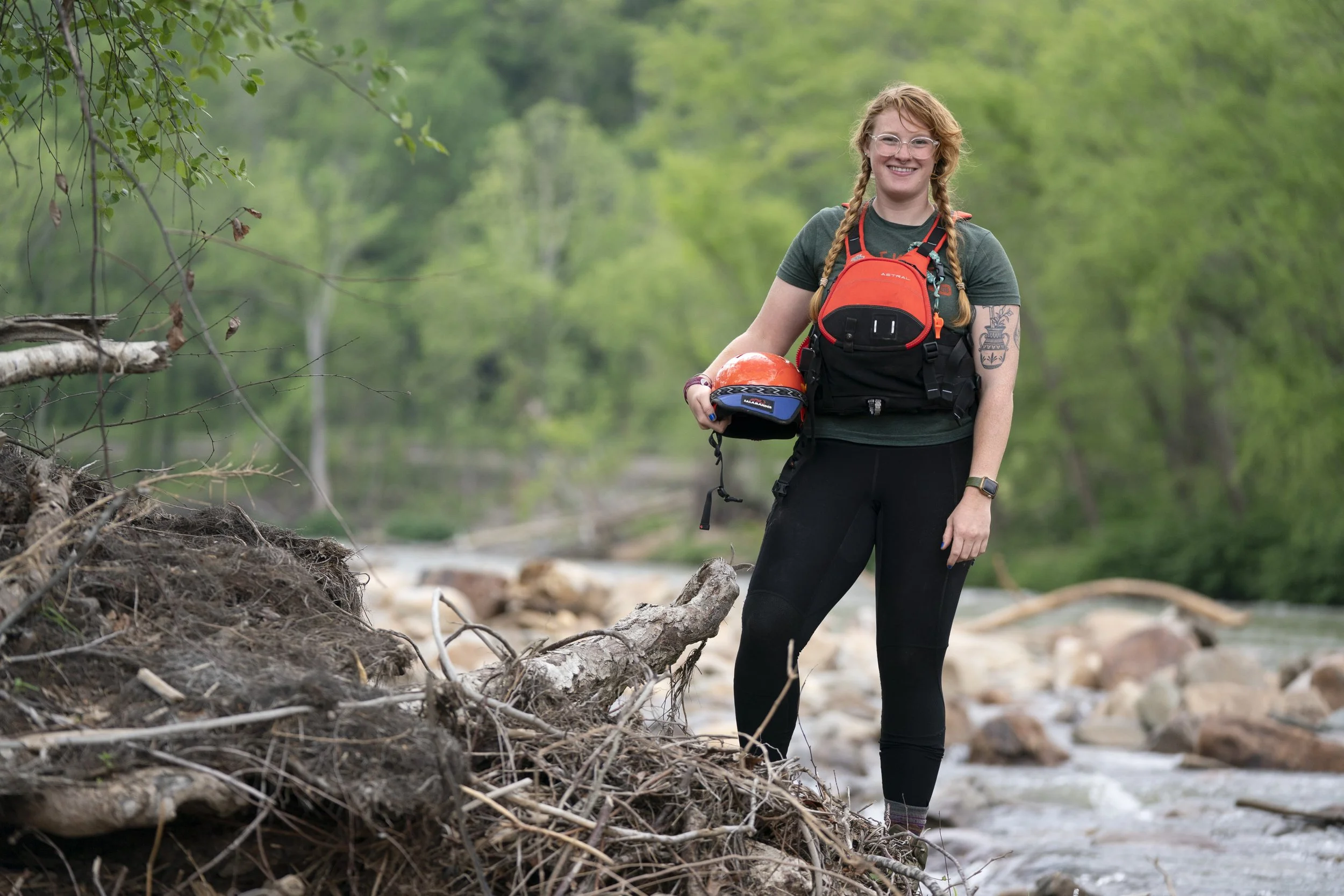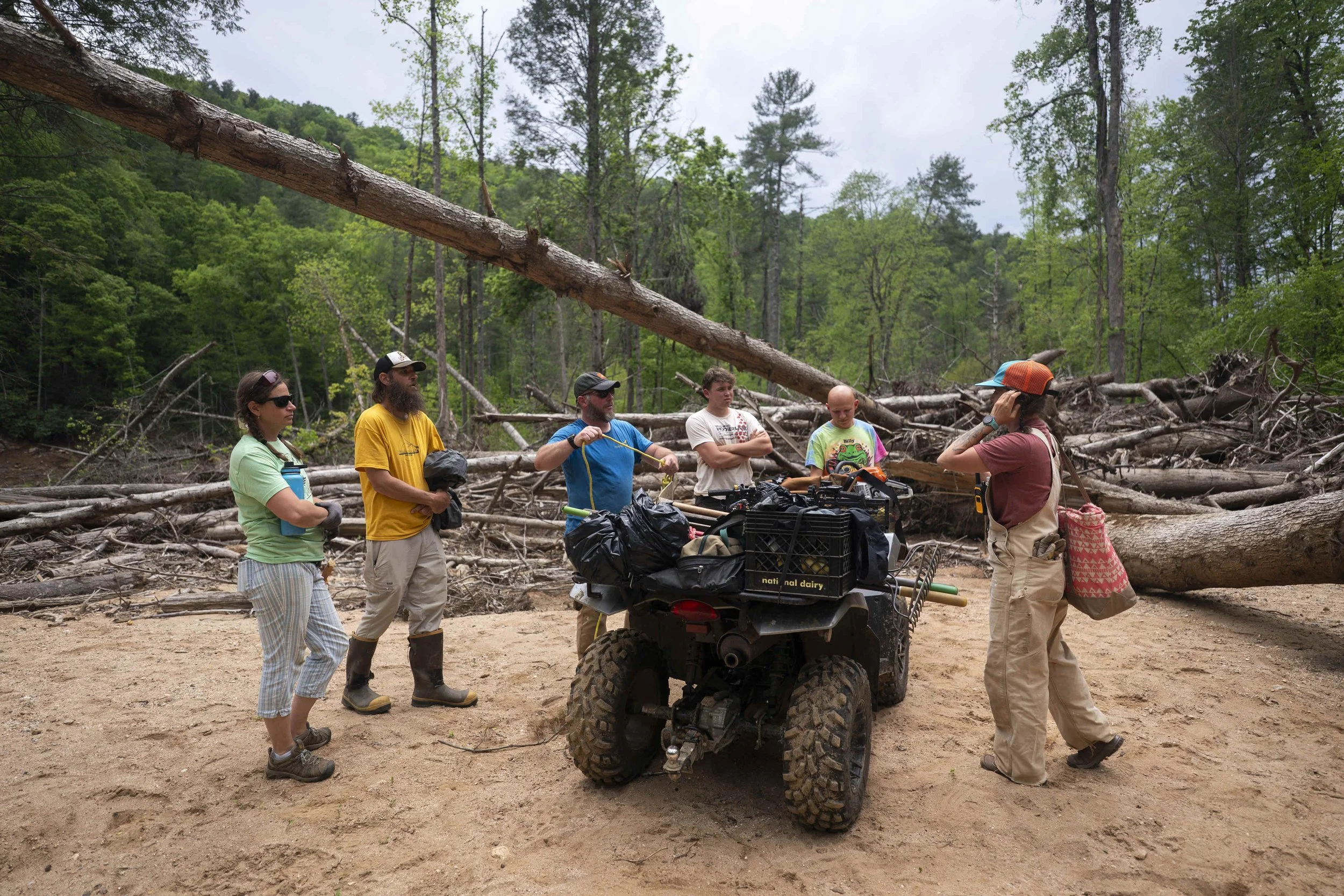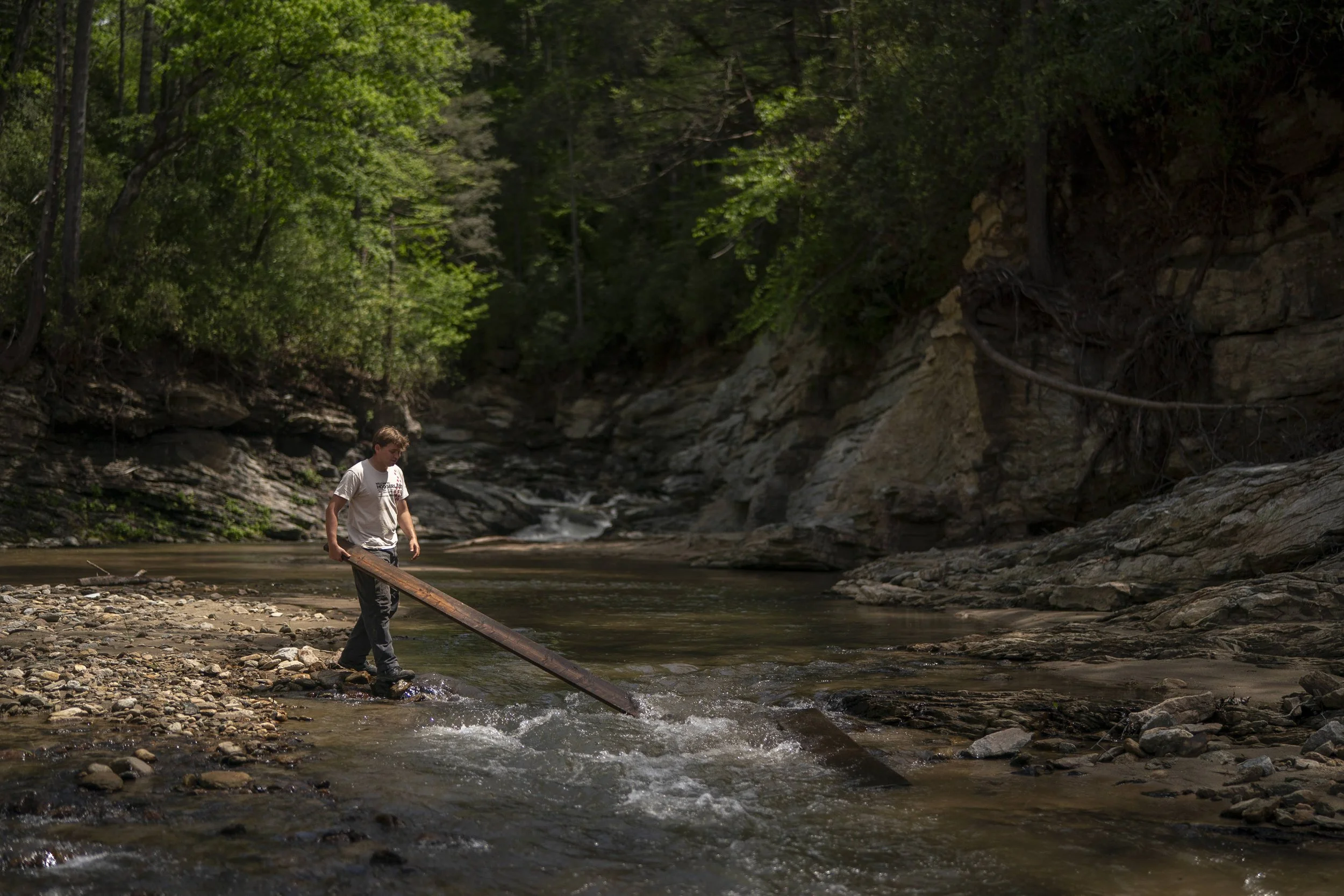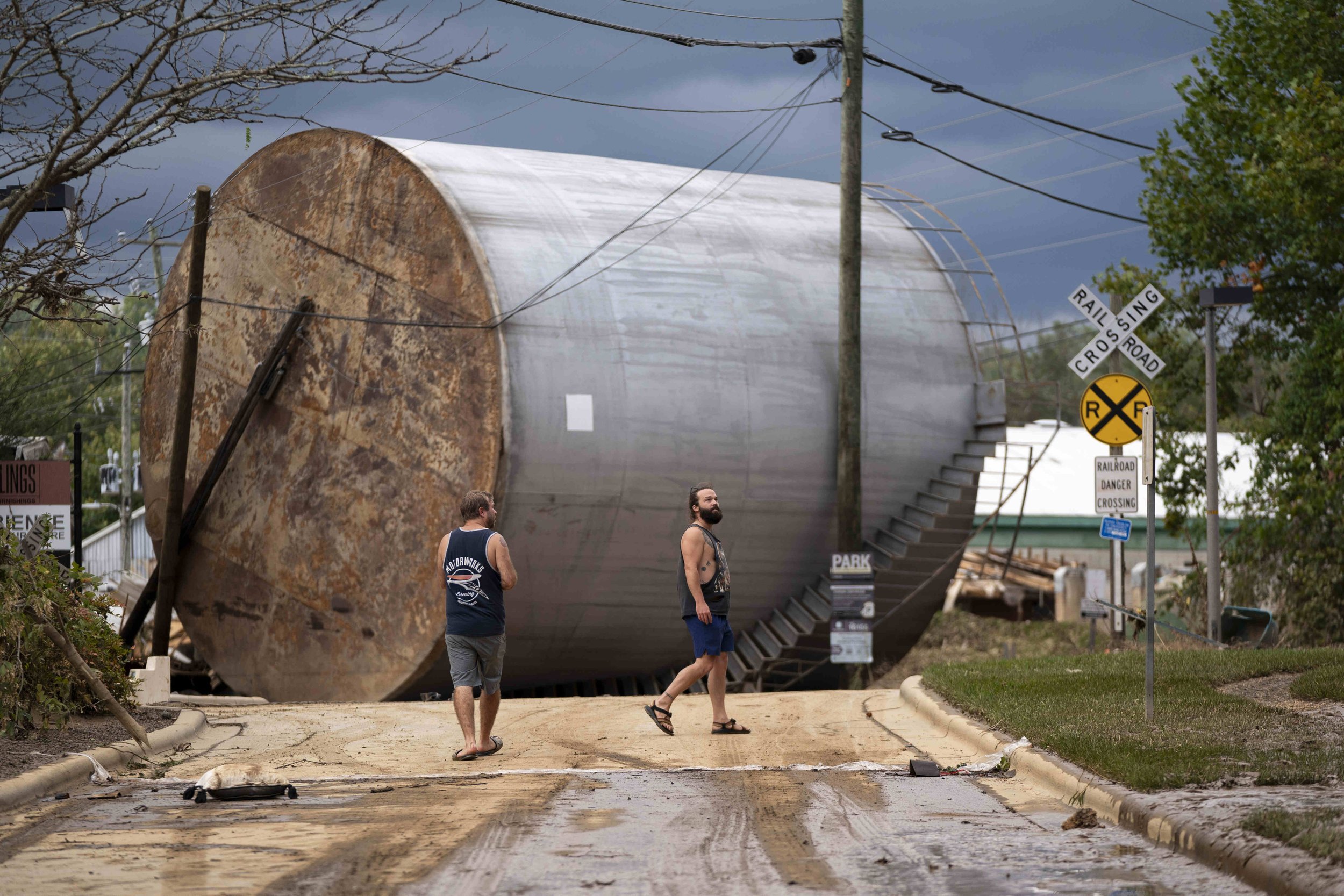Hurricane Helene trashed NC rivers. Now what?
Photos and words by Sean Rayford
Workers shuttle bundles of debris across a channel at “PVC Island “ on Section Nine of the French Broad River in Madison County in western North Carolina. More than seven months after Hurricane Helene turned tributaries into raging torrents of death and destruction — Carolinians are still reclaiming the area’s natural resources and economic drivers. (All photos made May 2-3, 2025 in Madison and Henderson Counties, North Carolina)
On Section 9 of the French Broad River in Western North Carolina, Jon Stamper and his crew of former river guides wrangle what looks like a charging cord drawer from hell. Seven months after Hurricane Helene, this special pilot team spends their workdays pulling trash and debris from rivers and creeks in storm ravaged Southern Appalachia.
Stamper, a combat veteran who found post-military solace in the outdoor community, now leads river cleanup efforts after losing his job when Helene destroyed all four locations of an Asheville outdoor outfitter.
His crew cuts the flexible pipe into six-foot sections and using small inflatable boats, they ferry bundles of PVC across channels. Then they haul the debris upriver on a jet boat — where a dumpster awaits.
One of the oldest rivers in the world — flowing northwest out of Asheville into Tennessee, the French Broad River carved it’s path before the rise of the ancient Appalachians. Before Helene, this watershed brought an economic impact equal to the Blue Ridge Parkway and The Great Smoky Mountains — combined.
Chris Hlavay, who previously worked at a river outfitter assisting customers with tubing, rafting, and kayaking trips, stands on PVC Island on the French Broad River. MountainTrue has removed 2.8 million pounds of debris, with Stamper’s team hand picking an average of 8,300 lbs per week. To qualify for the 12 person clean-up team, one had to have lost their job because of Hurricane Helene.
Jemima
Jemima Fillis-Cook has spent 25 years finding ways to be outside and on a river. Formerly a river guide, she married a fisherman and supports his “harebrained schemes buying up boats of various variety.”
Before Helene, she operated a coffee shop along the Laurel River between the towns of Hot Springs and Marshall. Her store escaped catastrophic flooding but winds destroyed the roof. Today, the place sits gutted.
But Jemima is now part of Stamper’s team and MountainTrue’s paid workforce. “I’m losing latte and muffin weight and getting my head clear. Just being alone with my own thoughts while I pick trash out of log jams and bring some order to the chaos that the storm created,” she says, “Sometimes there are silver linings that you pause and enjoy them while you have them. Knowing that you may change gears and do something totally different with life just because there was punctuation,” says Jemima.
And those harebrained ideas of her husband, Matt Cook?
Stamper recruited the couple because Matt — a fishing guide of 20+ years, runs jet boats on these rivers.
Matt
“It just worked out great. We had the equipment and the skills to operate a motor boat in the sections of river — in the class three and four white water stuff — to start helping haul this trash out,” says Matt.
The Cooks live in the unincorporated community of Hurricane — in Madison County, North Carolina and Matt has been taking folks on area rivers since he was a student at App State. His experience with motor boats in mountain whitewater pushes nearly a decade.
The Cooks work together at PVC Inland on the French Broad River.
Most recently, Matt acquired an inflatable jet boat. “It's kind of like a jet ski. It sucks the water up and spits it out the back,” he explains, “You can run in a few inches of water, as opposed to needing a foot to 18 inches of water. So we can take that boat in sections of the river [where] you just normally wouldn't be able to use any sort of power.”
Without it, the team would have to paddle debris upstream — or send trash down river to the next access point.
“Either side of the river, and on all the islands and rocks and stuff on the river, there's a bunch of trash. And it doesn't look like anybody else is going to come along and clean it up, so MountainTrue is paying us to take it out. One bag, one pipe at a time,” says Matt.
Mandy
Before Helene, Mandy Wallace was a raft guide. These days, she’s also harnessing an education and previous experiences in archaeology — reuniting items lost in the storm with their owners. Recently, they’ve returned a Men’s Baptist Disaster team hat, with pins commemorating nearly a dozen hurricane deployments — and a family photo album sealed and protected in mud.
“There's so much bad that we're seeing daily. Just people's lives — they just got ripped out of the mountains. Literally. And when you can do that and give people back something, you know that’s just the best feeling ever,” says Mandy, who shares these stories on the MountainTrue social media accounts.
Liz McGuirl on the French Broad River at PVC Island.
Liz
Before the storm, Liz McGuirl was managing a hair salon in downtown Asheville. In the aftermath she signed up for every volunteer opportunity she could find.
“And within probably two weeks, I did my first cleanup with MountainTrue in Asheville in the River Arts District. And fell in love with MountainTrue and their mission statement,” says Liz.
An avid hiker, Liz visited more than 300 waterfalls in Western North Carolina during a four year period.
“I wanted to come out and see all the different areas that I used to hike and what happened to them. So part of it was that, but part of it was also just wanting to give back to the places that have done such healing things for my own soul throughout time.”
Greta Morgan was gearing up for her third season working in the Western North Carolina outdoor industry when Hurricane Helene hit. And until this crew started in March, she had been out of work.
“I was super excited to get in there and get my hands dirty working with such a legend. And then we started at Stackhouse,” she says, “Which is near and dear to every boater’s heart that's been on the French Broad. To see it look like that was just kind of devastating.”
Greta will work with Stamper’s crew until she leaves for the summer — to guide on the New River in West Virginia.
“At end of the day, you know you're doing a good thing. You go home tired and dirty and feeling good about what we've done. And seeing us make progress, not even day-by-day, but hour-by-hour. The banks are getting clear,” says Greta.
Despite her summer job, she says Asheville is home. “I plan on coming back here and making it my home again.”
Chilly Curwin, who previously worked at an Asheville based adventure outfitter, shuttles debris across a channel on the French Broad River.
To qualify for this team, one had to have their job because of Helene. Stamper used this opportunity to hire many from the outdoor and river community. “They bring to the table so much knowledge and skills and technical ability, and they'll allow us to operate in some of these situations and environments that you know may not be safe for just the average volunteer.”
With a strategy in place for additional teams across western North Carolina, MountainTrue is hoping for funding from the North Carolina state legislature — as federal support looks uncertain. Stamper jokes about how they got him into a suit to address leaders.
“We pretty quickly realized, if we can do this much with 10 people, we can do a whole lot more with 100 people.”
Working around the efforts of the Army Corps of Engineers, with their heavy equipment pulling homes and cars out of the rivers, the Mountain True team performs precision cleaning on a delicate ecosystem while keeping tabs on the environmental impacts from the Army Corps.
This has been a concern on the world famous Green River, where his team recently cleared trails for a volunteer effort arriving the following day.
Stamper says his special crew has been a small part of the clean-up process - with volunteers and even guerrilla clean-up groups. The latter, able up to skirt bureaucracy. Many on his team started with a clean-up group organized by the local outfitter, Blue Heron — which Stamper used as an early model.
“It can be a little bit overwhelming when you pull up to a site and you're just facing this mountain of trash, but the team comes together, you start chipping away at it, and by the end of the day, you've made, like, a noticeable impact,” says Stamper, “Particularly with the volunteers, it gives them an opportunity to take back a little bit of control during what’s been a wild ride for everyone."
Travel/Outdoor resources for Western North Carolina
SEE MORE
Correction: Jemima Fillis-Cook’s name was originally misspelled and has been corrected


